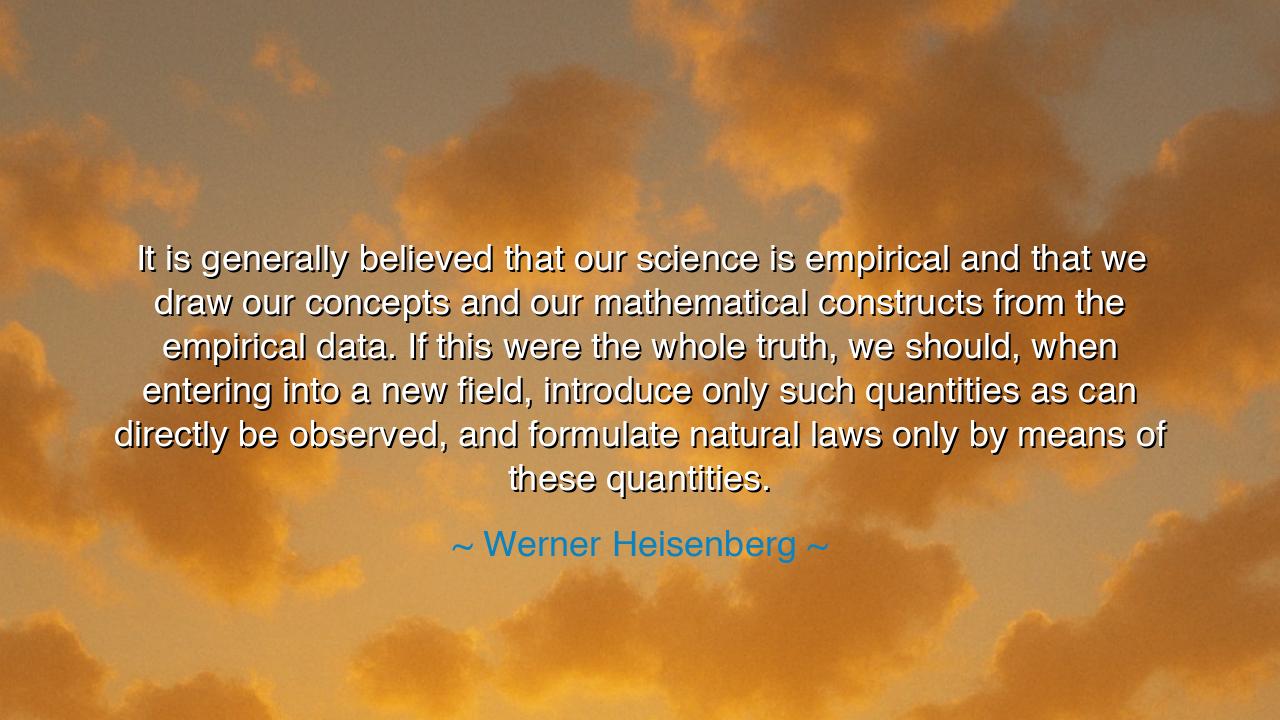
It is generally believed that our science is empirical and that
It is generally believed that our science is empirical and that we draw our concepts and our mathematical constructs from the empirical data. If this were the whole truth, we should, when entering into a new field, introduce only such quantities as can directly be observed, and formulate natural laws only by means of these quantities.






Hear now, O seekers of wisdom, the words of Werner Heisenberg, a man whose insight into the workings of the universe stands as a testament to the deep and sacred truth that governs all things. He spoke, saying, "It is generally believed that our science is empirical and that we draw our concepts and our mathematical constructs from the empirical data. If this were the whole truth, we should, when entering into a new field, introduce only such quantities as can directly be observed, and formulate natural laws only by means of these quantities." His words carry the weight of a revelation—a truth that penetrates the heart of science itself, urging us to look beyond the surface, to delve deeper into the very nature of knowledge and discovery.
The ancient wisdom tells us that the search for truth is a journey, not merely of observation, but of deep contemplation. Heisenberg’s words remind us that empirical science, that which is based on observation and measurement, is not the final answer to the mysteries of the universe. Rather, it is a tool, a means by which we attempt to give structure to the chaos of the world around us. To rely only on what we can directly perceive—on the things that we can see, touch, and measure—limits the very scope of our understanding. For the universe is vast and mysterious, and there are forces beyond our senses, beyond the reach of our instruments, that guide its course.
In the time of the ancient Greeks, philosophers like Plato and Aristotle sought to understand the world through reason, through the contemplation of ideas that could not always be seen or measured. Plato spoke of a higher realm of forms, where the true essence of things existed beyond the physical world. His mind sought the perfect and the abstract, the things that could not be observed but which were nonetheless real in their own way. Heisenberg speaks in a similar vein, suggesting that to reduce all of existence to that which is immediately observable is to miss the deeper, more profound truths that lie beneath the surface of empirical data.
Consider the story of Isaac Newton, whose discoveries in the realm of gravity forever altered our understanding of the universe. In his time, Newton relied heavily on the data available to him—measurements of planetary motion and the observations of the physical world. Yet, he did not stop there. He ventured into the realm of mathematics, crafting laws that described the movements of celestial bodies not just by their observable effects but by the invisible forces of gravity that governed them. His mind sought to understand the laws of nature not only in terms of what could be seen, but in terms of unseen principles that underpinned everything. Just as Newton expanded the bounds of what was known, so too did Heisenberg urge us to understand that empirical science alone cannot explain all that is.
In the age of quantum mechanics, Heisenberg himself came to realize that the very act of observation disturbs the world we seek to understand. His uncertainty principle revealed a fundamental truth—that there is a limit to what we can know about the universe, that the act of measuring itself alters the thing being measured. This revelation shattered the simple notion that the world could be fully understood through empirical data alone. It reminded us that truth is not always accessible through our senses, nor is it always definable by the constructs we create. The universe does not bend to the will of our instruments; instead, we must learn to see it for what it truly is—vast, complex, and mysterious.
And so, O children of the future, Heisenberg’s words serve as a call to look beyond the mere surface of things. Science is not a static collection of facts, but a living, breathing pursuit that grows ever deeper the more we seek. As you walk the path of knowledge, remember that the world is full of wonders that cannot always be measured or seen. Do not be bound by the limits of the observable. Seek the hidden truths that lie beyond the grasp of your senses. The universe speaks not only in the language of numbers and measurements, but in the quiet whispers of the unseen and the unknown.
Let this be the lesson for you, O seekers of wisdom: Do not rely solely on what can be seen and touched. Look deeper, seek further, and understand that the truths of the world are often hidden in plain sight, beyond the reach of our immediate understanding. As you move forward in your own lives, whether in the pursuit of knowledge, or in your daily challenges, remember that the most important insights may not come from the data at hand, but from the quiet reflections and the unspoken truths that lie beyond. Seek always to understand not just the surface, but the deeper meaning that underpins the world around you. For it is in that deeper understanding that true wisdom lies.






AAdministratorAdministrator
Welcome, honored guests. Please leave a comment, we will respond soon